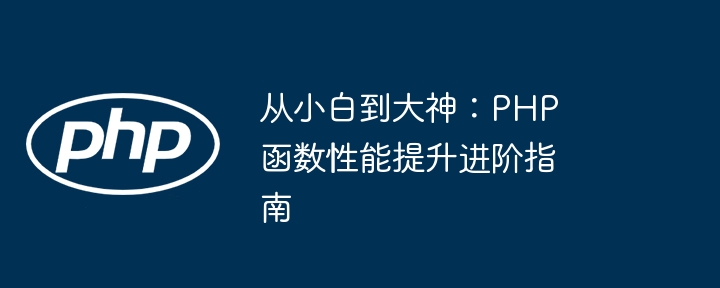 Backend Development
Backend Development
 PHP Tutorial
PHP Tutorial
 From Novice to Master: Advanced Guide to Improving PHP Function Performance
From Novice to Master: Advanced Guide to Improving PHP Function Performance
From Novice to Master: Advanced Guide to Improving PHP Function Performance
Proficient in PHP function performance optimization, from novice to master: avoid dynamic function calls and call functions directly. Use namespaces to reduce function name resolution overhead. Avoid using local variables and use global variables whenever possible. Use immutable data types to avoid creating new copies. Cache function results to avoid double calculations. Use Opcache to cache compiled code and improve execution speed. Use a JIT compiler to compile PHP code into machine code to further improve performance.

From novice to master: Advanced guide to improving PHP function performance
Foreword
Performance of PHP functions Optimization is the key to improving the efficiency of web applications. This article will delve into advanced techniques for improving PHP function performance and help you transform from a novice to a function performance optimization master.
Optimization tips
1. Avoid dynamic function calls
Dynamic function calls (call_user_func($fn) ) will bring additional overhead, so it is recommended to call the function directly, for example: $fn().
2. Use namespaces
Using namespaces can reduce the overhead required for function name resolution. For example, write: namespace\fn() instead of: global\namespace\fn().
3. Avoid local variables
Local variables will be created and destroyed every time the function is called, causing additional overhead. Use global variables whenever possible.
4. Use immutable data types
Strings and arrays are mutable data types, and new copies are created every time they are modified. This can be avoided by using immutable data types such as scalars.
5. Caching results
If the result output by the function will not change, you can cache the result and return it directly. This can significantly improve performance.
6. Using Opcache
Opcache is a PHP extension that stores compiled PHP code in memory, thus avoiding compilation on every call. This can significantly improve function execution speed.
7. Use the JIT compiler
The JIT compiler (Just-In-Time) was introduced in PHP 8, which can dynamically compile PHP code into machine code. further improve performance.
Practical case
Consider the following code:
function foo($n) {
for ($i = 0; $i < $n; $i++) {
$arr[] = $i;
}
}Optimization measures:
- Use Immutable data type: Change to
$arr = range(0, $n - 1);. - Use cache: store the array outside the function and return the cache in the function, such as:
static $arr; if (is_null($arr)) { $arr = range(0, $n - 1); } return $arr;.
Conclusion
By following these advanced tips, you can significantly improve the performance of your PHP functions. By optimizing function calls, data handling, and caching, you'll create efficient and responsive PHP applications.
The above is the detailed content of From Novice to Master: Advanced Guide to Improving PHP Function Performance. For more information, please follow other related articles on the PHP Chinese website!

Hot AI Tools

Undresser.AI Undress
AI-powered app for creating realistic nude photos

AI Clothes Remover
Online AI tool for removing clothes from photos.

Undress AI Tool
Undress images for free

Clothoff.io
AI clothes remover

AI Hentai Generator
Generate AI Hentai for free.

Hot Article

Hot Tools

Notepad++7.3.1
Easy-to-use and free code editor

SublimeText3 Chinese version
Chinese version, very easy to use

Zend Studio 13.0.1
Powerful PHP integrated development environment

Dreamweaver CS6
Visual web development tools

SublimeText3 Mac version
God-level code editing software (SublimeText3)

Hot Topics
 CakePHP Project Configuration
Sep 10, 2024 pm 05:25 PM
CakePHP Project Configuration
Sep 10, 2024 pm 05:25 PM
In this chapter, we will understand the Environment Variables, General Configuration, Database Configuration and Email Configuration in CakePHP.
 PHP 8.4 Installation and Upgrade guide for Ubuntu and Debian
Dec 24, 2024 pm 04:42 PM
PHP 8.4 Installation and Upgrade guide for Ubuntu and Debian
Dec 24, 2024 pm 04:42 PM
PHP 8.4 brings several new features, security improvements, and performance improvements with healthy amounts of feature deprecations and removals. This guide explains how to install PHP 8.4 or upgrade to PHP 8.4 on Ubuntu, Debian, or their derivati
 CakePHP Date and Time
Sep 10, 2024 pm 05:27 PM
CakePHP Date and Time
Sep 10, 2024 pm 05:27 PM
To work with date and time in cakephp4, we are going to make use of the available FrozenTime class.
 CakePHP File upload
Sep 10, 2024 pm 05:27 PM
CakePHP File upload
Sep 10, 2024 pm 05:27 PM
To work on file upload we are going to use the form helper. Here, is an example for file upload.
 CakePHP Routing
Sep 10, 2024 pm 05:25 PM
CakePHP Routing
Sep 10, 2024 pm 05:25 PM
In this chapter, we are going to learn the following topics related to routing ?
 Discuss CakePHP
Sep 10, 2024 pm 05:28 PM
Discuss CakePHP
Sep 10, 2024 pm 05:28 PM
CakePHP is an open-source framework for PHP. It is intended to make developing, deploying and maintaining applications much easier. CakePHP is based on a MVC-like architecture that is both powerful and easy to grasp. Models, Views, and Controllers gu
 CakePHP Creating Validators
Sep 10, 2024 pm 05:26 PM
CakePHP Creating Validators
Sep 10, 2024 pm 05:26 PM
Validator can be created by adding the following two lines in the controller.
 How To Set Up Visual Studio Code (VS Code) for PHP Development
Dec 20, 2024 am 11:31 AM
How To Set Up Visual Studio Code (VS Code) for PHP Development
Dec 20, 2024 am 11:31 AM
Visual Studio Code, also known as VS Code, is a free source code editor — or integrated development environment (IDE) — available for all major operating systems. With a large collection of extensions for many programming languages, VS Code can be c





